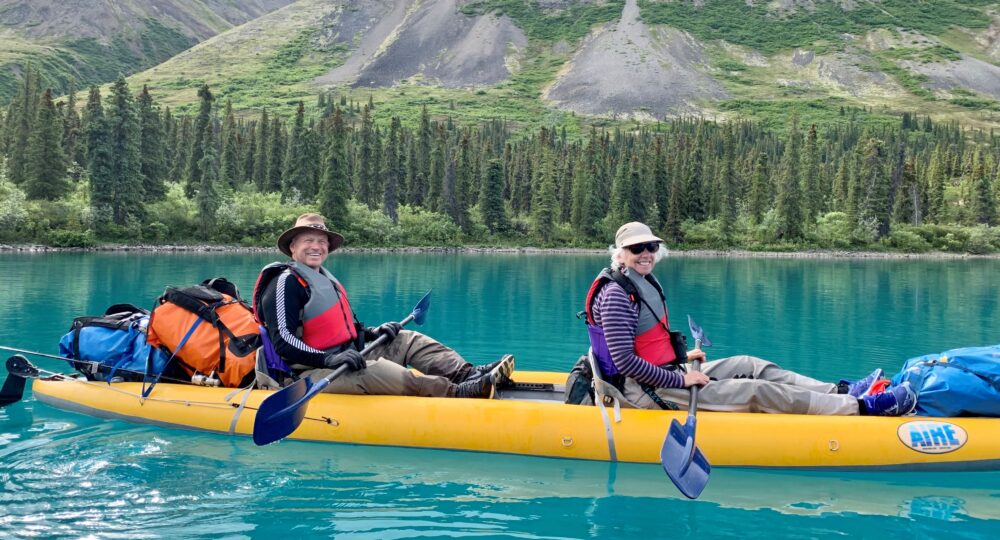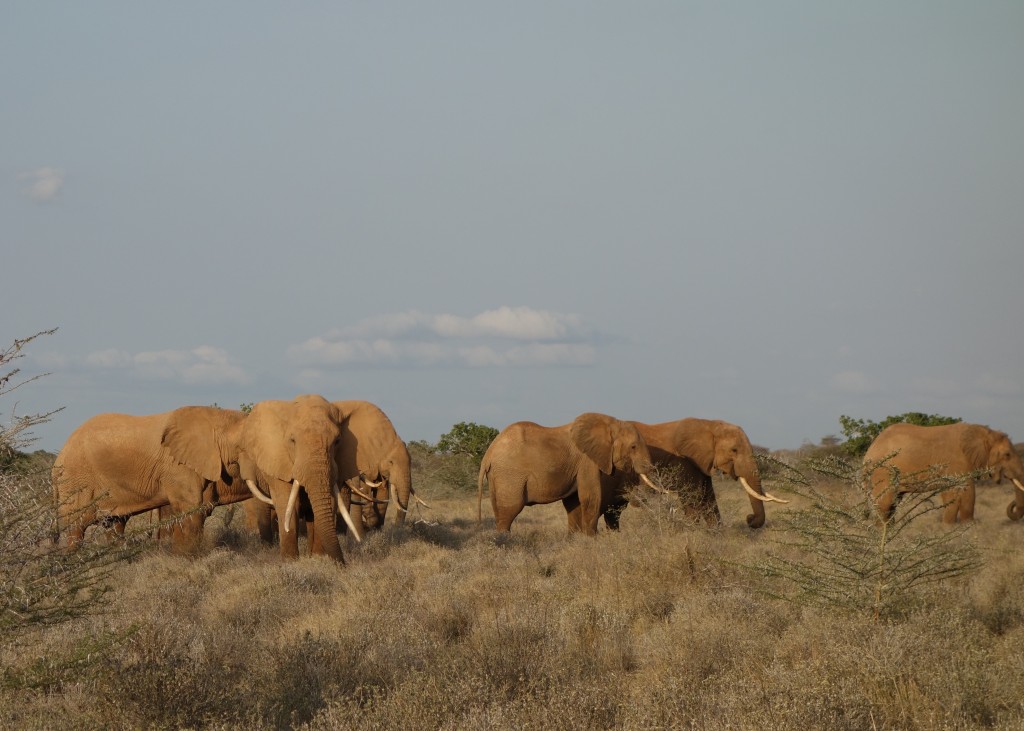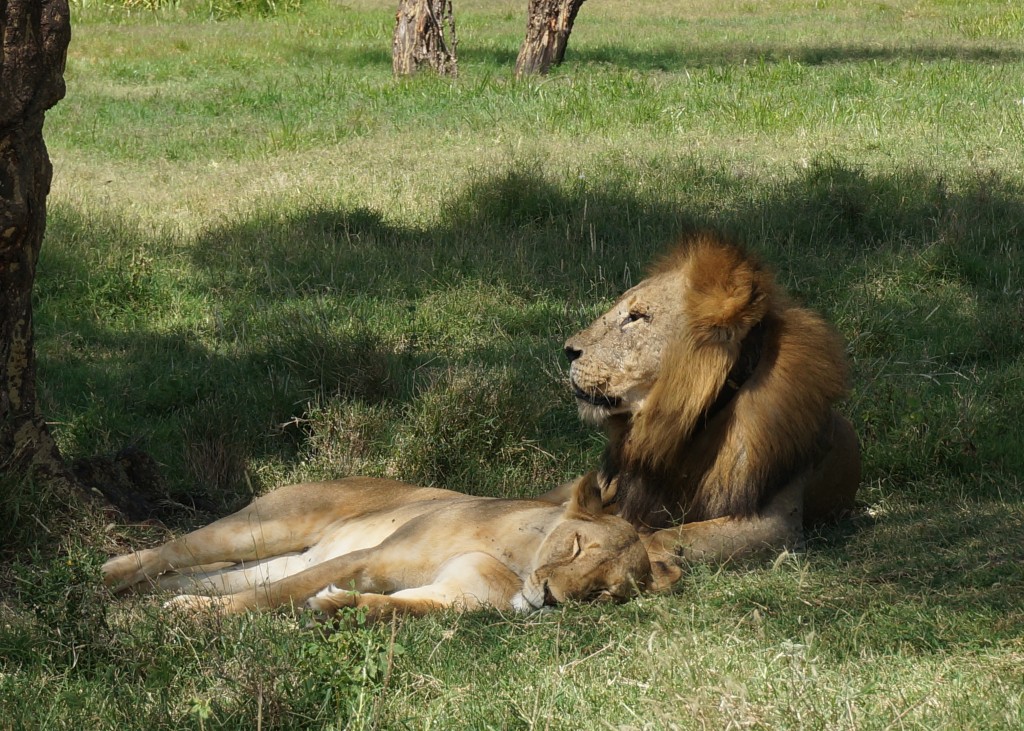Believe it or not, I decided on Monday that my next post would be about hunting. John and I are back in Kenya for three weeks and we spent the weekend outside of Tsavo East National Park, home to many of Kenya’s last “big tuskers;” elephants whose tusks each weigh over 100 lbs. It is also home to the Wata people, a culture intimately intertwined with elephants. More than any other Kenyan culture, the Wata rely on elephants for their sustenance, their status, their incomes, their rituals and their sense of history. Wata are elephant hunters. They are poachers.
Not surprisingly, dinner table conversation veered heavily toward the topic of big game hunting. Should it be legal? Is it ethical? What are its consequences? Should the historical practices and rights of indigenous people be considered? Apparently there is a growing body of scientific research that shows a virtuous link between hunting and wildlife preservation. Over the past 20 years, countries that allow and tightly regulate hunting have stable, even increasing wildlife numbers. In countries that prohibit hunting, like Kenya, poaching has soared and animal numbers plummeted.
Our host gave me a book to read: “What I Tell You Three Times is True: Conservation, Ivory, History and Politics” by Ian Parker, a lifetime conservationist and true warrior in the effort to save African wildlife. In Ian’s book, the villains are big NGO’s and conservation organizations acting in collusion with government managed wildlife monopolies to pursue their own fund-raising agendas. So too are animal rights activists in distant countries with misplaced ideas and no understanding of Africa. For Parker, traditional people, community conservation and responsible hunting are a good part of the solution. It was food for thought.
And then Dr. Walter J. Palmer, slayer of Cecil the beloved Zimbabwe lion and a Minnesota dentist – our Minnesota dentist! — hit the news and went viral. By now you probably know the case: bow-hunting big game hunter (Dr. Palmer) hires professional hunting guides in Zimbabwe to bag a prize lion. He acquires a permit for about $55,000 and entrusts himself to his paid handlers. They proceeded to bait a mature male lion, Cecil, out of a National Park into a private reserve where Dr. Palmer shoots it with his bow and arrow. The lion is wounded and the party tracks him for 40 hours before finding him, killing him with a rifle shot and then beheading and skinning him. In the process they (the humans) “discover” that Cecil has a radio collar that marks him as a studied lion and they attempt to cover their tracks by destroying the collar. It doesn’t entirely work. Since Cecil is a popular lion frequently seen in the National Park and he has a radio collar, people soon realize that he is missing and take up the hunt. The news media breaks the story, identifies the parties and the rest is history. Dr. Palmer is the recipient of the worst kind of viral internet shellacking, his office is shut down by protesters and he is front page international news. John and I, along with an untold number of his other patients write him a letter saying we are taking our business elsewhere. I do refrain, however, from name calling, vitriolic descriptions of what should be done to him or threats on his life.
Because, frankly, I think some of this is complicated. This is the letter (with some updating and modifications) that I sent to Dr. Palmer’s office this morning.
Dear River Bluff Dental:
My husband, John Knapp, and I have been clients of Dr. Palmer for many years but we will be moving our business to another dentist. It is my fervent hope that Dr. Palmer takes responsibility for his actions and learns from this. In my world view, that is the only way he can redeem himself and, possibly, recover professionally. Denying it was his fault and blaming it on his guides isn’t going to win over the hearts of the people.
While I don’t personally understand the desire to hunt for sport, and I find the whole subject somewhat nauseating, I have learned to appreciate and accept the contributions that hunters make to conservation. Around the world, hunters are some of the biggest supporters of habitat and species conservation. The money they pay for hunting licenses and their deep involvement with wildlife is critical to conservation efforts, including in Africa.
This feeling, however, applies only to hunting conducted legally under tightly controlled regulations that consider things like population densities, age and sex of the animals, where animals can be taken and other relevant items. In African countries it also means that local people benefit from the funds raised and money spent.
Dr. Palmer makes the argument that he had all the legal licenses to shoot a lion in Zimbabwe and hired professional guides to assist him in that effort. This is part of the text from his letter we received from him this morning:
“In early July, I was in Zimbabwe on a bow hunting trip for big game. I hired several professional guides and they secured all proper permits. To my knowledge, everything about this trip was legal and properly handled and conducted.
I had no idea that the lion I took was a known, local favorite, was collared and part of a study until the end of the hunt. I relied on the expertise of my local professional guides to ensure a legal hunt.”
This is my response:
First, a radio collar on an animal is large and fully visible. They aren’t hard to spot and I’ve seen them on big-maned lions like Cecil. Dr. Palmer says he didn’t see the collar. That is hard for me to believe and an unacceptable excuse. It was his responsibility to see it. He was the one with the weapon. He was the one who pulled the trigger. If you are going to kill something, you have the final and ultimate responsibility for ensuring that it is legal and right.
Secondly, there is no excuse for silence once Dr. Palmer suspected a crime had been committed. Dr. Palmer says that he didn’t realize Cecil was collared and part of the study until the end of the hunt. One news article reported that when Dr. Palmer found out, he was furious. Either way, that hunt was weeks ago. Why didn’t Dr. Palmer report the kill immediately to the authorities? The destruction of the collar was a clear attempt at cover up. Once Dr. Palmer realized his mistake, it was his responsibility to fess up, not flee.
Third, this is not the first time Dr. Palmer has been involved with bending the hunting rules if it meant he could get a prize trophy. He knowingly lied to Federal authorities in 2008 about the location of a bear he shot to make it appear as if it were legal.
It looks to me like Walter Palmer is more interested in his desire for a trophy kill than in the “nuances” of hunting regulations, the ethics of a good hunter and conservationist or in taking responsibility for his actions. Hunting creates death. If you want to kill things, to take an animal’s life for sport, you and only you are responsible for doing it legally and with respect and honor to the animal.
Sincerely
Anne Knapp
A final word to our Tencenturies readers: From the comfort of our lives in the United States, where our exposure to big game is filtered through Photoshopped pictures and National Geographic highlight videos, it is easy to condemn Dr. Palmer and then cast that judgment over all hunting and hunters. I don’t feel sorry for my ex-dentist but I recoil from the hatred flowing from those who call for his ruin, even his death. Let us pause to consider that the Africans who must protect these animals don’t share these views. It is an Inconvenient Truth for animal lovers that outlawing hunting does not protect wildlife. If we want lions, elephants, rhino and other iconic mega fauna to survive, it might be a good idea to pause and figure out what really does.




Dear Anne, I have been wondering about “legalized hunting” in Africa, and in other parts of the world, as a way of culling the old and sick, providing food for people, etc. I do not think “big game” hunting should be allowed anywhere. Period. The best animals are taken and the herds weakened. Thank you for your letter and for the terrific information. I think your approach will allow your argument to be heard and appreciated. Sending love, B
I agree with Beryl, who said it well. You know me: I can’t fathom why anyone kills for pleasure. Thanks for another thoughtful article about a painful subject.
Thank you for your insitefull remarks. Here in Montana ,we live in a hunting culture. While I do not hunt I appreciate the need to eat local game, cull heard or packs to eleminate overpopulation which leads to disease and starvation and invasion into peopled areas. Responsibility is the key. Life is prescious in any species. It is a wonderful gift to watch wildlife in its natural habitat. Unfortunately greed, power and meanness exist in some humans and there is suffering.
A clarification, the approximately $55,000 that Palmer paid was for the safari excluding his cost of transportation. It included all license and permit fees but we don’t know how much that portion was.
Well done, Anne. It really is a small world, isn’t it?
OMG . . . he is your dentist? That is so wild. I am glad you parted ways.
I can’t fathom trophy hunting. When I was much younger and watching Tarzan I imagined hunters trekking through dense jungle forests to track down wild beasts. The possibility of the table turning and the hunter becoming prey was ever present and the scene was exciting. But reality is different. I have seen bears, elephants, rhinos, hippos, alligators, moose, zebra, gazelle, lions, etc. in the wild and if I had a gun I could have taken them all down without having any special skill. Hunting for bragging rights is shameful.
I agree with your point about how hunting can support conservation. A good example might be the organization, Ducks Unlimited. I don’t know them extremely well, but they do support vibrant wetlands. They recognize that without conservation efforts, their quality of their hunting experience will diminish over time. I also just renewed my fishing license today.